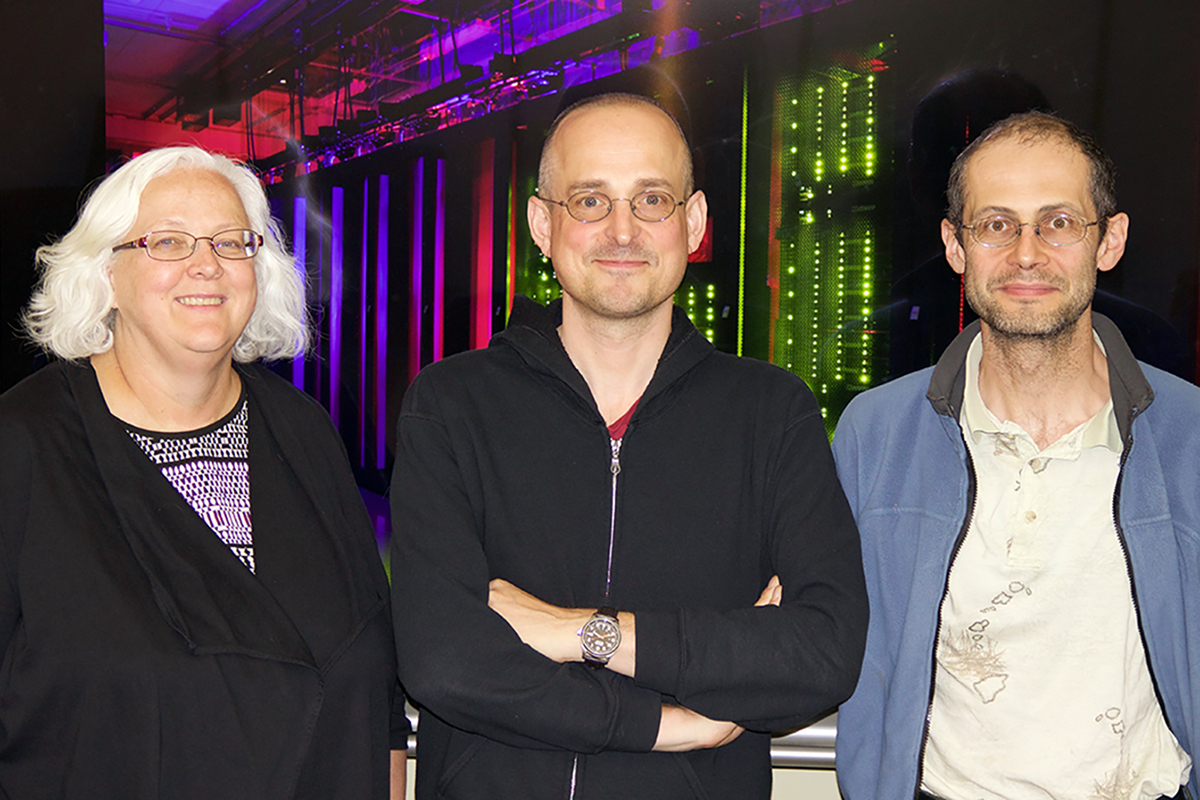You’re accessing archived content
This is archived content from the UIT website. Information may be outdated, and links may no longer function. Please contact stratcomm@it.utah.edu if you have any questions about archived content.
Meet Your Colleagues: CHPC User Services

From left, CHPC's Anita Orendt, assistant director of Research Consulting and Faculty
Engagement, and Scientific Consultants Wim Cardoen and Martin Cuma.
You're a researcher – elated after securing a grant to fund your project. There's only one problem. Well, three.
Problem 1: You need to get up and running quickly – that grant money has an expiration date, and time is ticking down.
Problem 2: You need powerful computers with high-speed connections capable of supporting software with exacting requirements.
Problem 3: Your research involves sensitive data, perhaps medical research, intellectual property or corporate assets.
In this hypothetical, where do you start?
Researchers at the University of Utah are fortunate to have the User Services Team in UIT's Center for High Performance Computing (CHPC) to guide these critical decisions. In a huge data set dilemma, they're the equivalent of a Don't Panic button.
"We all have a slightly different emphasis but essentially do the same thing – work with users when they come in and need help on how to get their work done at CHPC," said Anita Orendt, CHPC's assistant director for Research Consulting and Faculty Engagement.
Working out of the Intermountain Network Scientific Computational Center [map], Orendt works alongside Scientific Consultants Martin Cuma and Wim Cardoen. Together, they help U researchers use high-performance computing tools so that they can concentrate on their science, in addition to providing HPC user support for Utah State University.
"We focus on the installation of software packages, helping our users run their workloads, and training on a variety of topics," Orendt said.
Software Developer Chonghuan Xia specializes in web programming for CHCP's data-rich website, i.e., developing account allocation systems and maintaining user and equipment databases. The core User Services team is comprised of Orendt, Cuma and Cardoen. Orendt specializes in computational chemistry and related application support (i.e., Gaussian and Quantum Espresso). Cuma's expertise is parallel code development, programming around Compilers and MPI, and questions concerning MATLAB and Geophysics. Cardoen's focus is generally scientific computing related to C, C++, Fortran, Python, R, Java, MPI and Hadoop.
If you're thinking, "Compilers, Python ... Ha-what?", the User Services team doesn't expect every user to have an intimate knowledge of HPC tools. Part of their jobs is explaining these environments and applications through outreach, training, one-on-one consultations, and an open-door policy (although it's best to email Orendt at anita.orendt@utah.edu to set up an introductory consultation).
"We'll meet occasionally with faculty candidates or with reseachers embarking on a new project with a computational emphasis," Orendt said.

The SC16 conference was held at
the Salt Palace Convention Center.
Cuma said roughly half of any given day is occupied with responding to a queue of help tickets; the remainder is spent investigating a long-term project or working with individual users on a more complex issue.
"For example, I've been working with a single user for the last few days on a program that is running slowly, looking at the tools in use, going into the code, and optimizing it," he said.
Added Orendt, "Other tickets may be a request for an installation, 'my job failed, can you help me figure out why?' or 'I'm starting a new project, I need new resources, can we talk?'"
It's tempting to think of CHPC users exclusively in terms of chemistry or engineering, but researchers in fields such as biology (specifically genomics), geography, psychology – even humanities and fine arts – utilize CHPC services.
Outreach efforts include delivering presentations around campus, like for the U's IT Exchange Group. Because "there's always something new technology-wise," Orendt and her cohort also attend the annual Supercomputing Conference, where they staff a booth, interact with University, regional and national partners, and explore vendor products that may benefit CHPC users. This past year's SC conference was held in Salt Lake City. SC17 will be November 12-17, 2017 in Denver, Colorado.
Training opportunities
In addition to a series of short "how-to" videos, the User Services team hosts a series of free presentations and hands-on training throughout the year in CHPC resources: the longest iteration in fall, and abbreviated versions in spring and summer [schedule]. Unless otherwise specified, all classes start at 1:00 p.m. in the INSCC auditorium, room 110, and can be attended remotely via Skype. Each team member presents, depending on the topic.
"It's nice to see our users become more independent, and more productive," Orendt said.
CHPC handles more in-depth (often multi-day) training by periodically being a satellite site for monthly workshops hosted nationally by Extreme Science and Engineering Discovery Environment (XSEDE), which, unlike CHPC's general training, requires registration.
Getting started
For more information on available CHPC resources, including setting up an account, visit the User Services webpage. For help with a research computing concern such as initiating a help ticket through the JIRA system, visit their Getting Help webpage.
Node 4
Our monthly newsletter includes news from UIT and other campus/ University of Utah Health IT organizations, features about UIT employees, IT governance news, and various announcements and updates.
